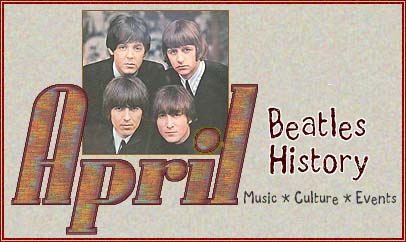 History offers History offers
a chance
to truly
understand
how the past
impacts the now.
Follow our
daily timelime
of historical
events to
discover the
role The Beatles
played in changing
the modern world.
THE FOLLOWING EVENTS TOOK PLACE ON APRIL 4
 1850--The city of Los Angeles, California is incorporated. 1850--The city of Los Angeles, California is incorporated.
1959--It Doesn't Matter Anymore becomes Buddy Holly's first posthumous hit, peaking at No. 13. Holly had died in a plane crash in February.
1961--The Beatles perform at the Top Ten Club, Reeperbahn, Hamburg, West Germany.
1962--The Beatles perform at the Cavern Club, Liverpool, at lunchtime and again at night.
1963--The Beatles, at BBC Paris Studio, London, record a third radio appearance for the BBC program "Side by Side." They had recorded two appearances for this show only three days earlier, and they declined the option to record a fourth show on this day. The standard opening duet of Side by Side with the hosts The Karl Denver Trio was not re-recorded; the version recorded previously was re-used. For their third program, The Beatles perform Too Much Monkey Business, Love Me Do, Boys, I'll Be On My Way, and From Me to You. The show is broadcast on June 24. The recording of I'll Be On My Way is the only studio recording that The Beatles made of this song, a Lennon-McCartney composition that was recorded by Billy J. Kramer and the Dakotas, appearing on the flip side of their Do You Want to Know a Secret single (also a Lennon-McCartney song). After the recording session, The Beatles travel to Stowe for a late-afternoon performance. The Beatles' recording of I'll Be On My Way is included on the 1994 Beatles double-CD Live at the BBC (Disc one, Track seven).
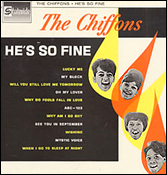 1963--The Beatles perform at Roxburgh Hall, Stowe School, Stowe, Buckinghamshire. This appearance is at a boys' public school and is due to the request of student Dave Moores, who had writen a letter inviting them there. 1963--The Beatles perform at Roxburgh Hall, Stowe School, Stowe, Buckinghamshire. This appearance is at a boys' public school and is due to the request of student Dave Moores, who had writen a letter inviting them there.
1963--No. 1 Billboard Pop Hit: He's So Fine by The Chiffons. [Note: In 1976 the estate of songwriter Ronnie Mack wins a lawsuit against former Beatle George Harrison. A judge rules that Harrison subconsciously copied his No. 1 song My Sweet Lord from He's So Fine.]
1964--Can't Buy Me Love becomes the #1 single in the US (Billboard). Beatles singles have held the #1 spot for 10 straight weeks.
1964--The Beatles hold the top five positions on the US singles chart: #1 Can't Buy Me Love (Capitol), #2 Twist and Shout (Tollie), #3 She Loves You (Swan), #4 I Want to Hold Your Hand (Capitol), and #5 Please Please Me (VeeJay). The Beatles also have the #1 and #2 albums, Meet the Beatles and Introducing the Beatles. Beatles singles also occupy positions #31, #41, #46, #58, #65, #68, and #79. The following week, another two songs would enter the Top 100, giving The Beatles a total of 14 songs on the singles chart.
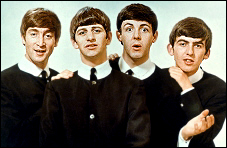 1964--Billboard reports: "Just about everyone is tired of The Beatles. Disc jockeys are tired of playing the hit group, the writers of trade and consumer publications are tired of writing about them, and the manufacturers of products other than The Beatles records are tired of hearing about them. Everyone's tired of The Beatles... except the listening and buying public." 1964--Billboard reports: "Just about everyone is tired of The Beatles. Disc jockeys are tired of playing the hit group, the writers of trade and consumer publications are tired of writing about them, and the manufacturers of products other than The Beatles records are tired of hearing about them. Everyone's tired of The Beatles... except the listening and buying public."
1967--The Beatles in the recording studio (Studio Two, EMI Studios, London). Final mixing for Within You Without You. At George Harrison's request, a few seconds of laughter is added to the end of the song, the effects taken from Abbey Road's tape library: Volume 6: Applause and Laughter.
1968--A promotional film for Lady Madonna is broadcast in black and white on UK television, on the BBC1 program "Top of the Pops." The video portion of the film clip was shot while The Beatles were performing the song Hey Bulldog, but the Lady Madonna audio track was paired with the video for the promo release. It won't be until 1999 that the video is broadcast with its original Hey Bulldog soundtrack.
 1968--Martin Luther King, Jr. is shot and killed on the balcony of a Memphis hotel. He was 39. Riots break out in 30 American cities, leaving 39 dead. James Brown goes on national television to urge restraint and a constructive channeling of anger. In New York, Jimi Hendrix, B. B. King, and Buddy Guy play an all-night tribute to the slain leader. "Injustice anywhere is a threat to justice everywhere." -- Martin Luther King, Jr. 1968--Martin Luther King, Jr. is shot and killed on the balcony of a Memphis hotel. He was 39. Riots break out in 30 American cities, leaving 39 dead. James Brown goes on national television to urge restraint and a constructive channeling of anger. In New York, Jimi Hendrix, B. B. King, and Buddy Guy play an all-night tribute to the slain leader. "Injustice anywhere is a threat to justice everywhere." -- Martin Luther King, Jr.
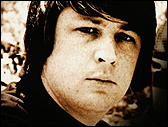 1974--While still on holiday in Los Angeles, Paul and Linda McCartney pay a visit to Brian Wilson, the now-reclusive Beach Boys genius, at his Bel Air home. The McCartneys bang on the door for over an hour, but Wilson refuses to let them in. They know Brian is there, because they can hear him inside, quietly crying to himself. Paul and Linda have no choice but to finally give up and go on their way. 1974--While still on holiday in Los Angeles, Paul and Linda McCartney pay a visit to Brian Wilson, the now-reclusive Beach Boys genius, at his Bel Air home. The McCartneys bang on the door for over an hour, but Wilson refuses to let them in. They know Brian is there, because they can hear him inside, quietly crying to himself. Paul and Linda have no choice but to finally give up and go on their way.
1975--Ringo Starr forms a new record label called Ring O’Records, a name that was suggested to him by John Lennon.
1977--US re-release of John Lennon single Stand By Me / Woman Is the Nigger of the World (Capitol Starline). Both sides previously released as the A-sides of singles.
1987--At a New York ceremony, Yoko Ono presents long-time rock promoter, Bill Graham, with the first “John Lennon New Age Award.”
1989--Paul McCartney receives an Ivor Novello award for "Outstanding Services to British Music."
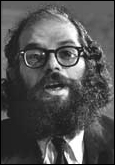 1995--British radio and TV personality, Kenny Everett (whose long association with The Beatles dates back to his coverage of their American tours in the sixties), dies in his sleep in his London home of an AIDS-related illness. 1995--British radio and TV personality, Kenny Everett (whose long association with The Beatles dates back to his coverage of their American tours in the sixties), dies in his sleep in his London home of an AIDS-related illness.
1996--Paul McCartney is still denying The Beatles will re-form. "The Beatles aren't interested," he says. "Money is not an issue. We wouldn't do it for twice as much. The answer is no."
1997--Allen Ginsberg, the legendary "Beat" poet (who was a friend of both John Lennon and Paul McCartney) dies of liver cancer at the age of 70.
For more day-by-day history go to HistoryUnlimited.net
|
 History offers
History offers


